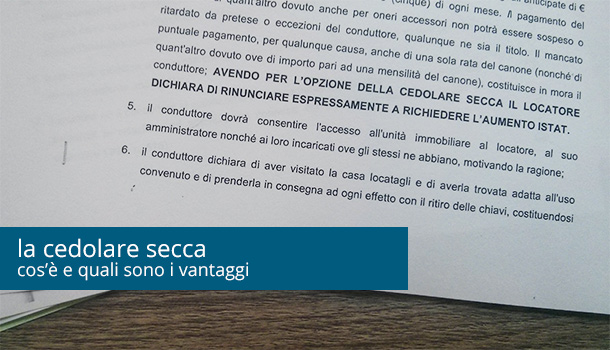“Dry coupon” is a tax break that reduces the taxation of income received from the rental of real estate for residential use, including student rentals. It takes the form of an alternative form of taxation that allows the landlord-that is, the person who rents out his or her apartment-to pay a tax in lieu of Irpef and related surcharges, registration tax and stamp duty, effectively lowering taxation.
All individuals who hold the right of ownership (or the right in rem of enjoyment) who rent their property for residential use and not for business activity are eligible for the dry coupon: basically, homeowners who rent an apartment to tenants for residential use, including students. Read in this regard the article on student lease.
Indice contenuto
To which contracts does it apply
Dry coupon can be applied to leases for residential use for properties classified in cadastral categories A1 to A9 and A11, whether they are rent-free contracts, that is, where the rental price is freely chosen by the landlord, or rent-agreed contracts – for which the rent is capped according to precise territorial agreements between the organizations of homeowners and the most representative tenants’ organizations at the national level – in cities with “high housing tension” (this includes basically all the large university cities: Milan, Turin, Bologna, Florence, Siena, Cagliari, Naples and Palermo. Here is theList of Municipalities with High Housing Strains).
Dry coupon can also be applied for housing units, leased to housing cooperatives or nonprofit entities, as long as they are sublet to university students and given to municipalities with a waiver of rent updating or assignment (Dl 47/2014).
How is it calculated
For free-rent contacts, dry coupon is calculated as 21% of the annual rent. For contracts with agreed rent, on the other hand, the dry coupon was recently revised and further reduced to 10 percent for the four-year period 2014-2017(Decree Law 102/2013 Cedolare Secca), from the previous 15 percent.
The benefits for owners
The main benefit to the homeowner is undoubtedly the lowering of taxation on the income derived from rent: on a contract with a dry coupon for a total rent 12,000 € per year the taxation will be 2,520 € (21%) in the case of free rent and 1,200 € (10%) in the case of an agreed rent, given that ordinary IRPEF provides for a minimum taxation of 23% on 95% of the rent received. Any assessment of convenience must obviously be made by the individual taxpayer, in relation to his or her specific tax situation, but dry couponing allows for very substantial savings in the vast majority of cases.
The benefits for tenants
While the application of the dry rent tax rate brings a strong tax advantage to the owners of the rented apartment, tenants also benefit:
- the adoption of dry couponing involves the zeroing of the registration tax – calculated as 2 percent of the annual rent multiplied by the number of annuities – and stamp duty – amounting to 16 euros for every 4 written sides of the contract and, in any case, for every 100 lines – , taxes conventionally divided in half between the owner and the tenant;
- the landlord who opts for dry coupon waives the ISTAT adjustment of the rent: the rent will therefore be unchanged and unchangeable for all the years of the contract term; in the absence of dry coupon, the landlord could instead decide to apply annual increases on the rent calculated on the basis of the ISTAT update;
- the reduction in the a cedolare secca for agreed rents, which has gone in recent years first from 19% to 15% and now to 10% can be used as a negotiating weapon in setting the rent: if, in fact, until two years ago, the dry coupon on an agreed rent of 1,000 € per month provided for a taxation of 190 €, now it provides for a taxation of 100 €: the 90 € of “tax discount” could be divided between landlord and tenant, with a possible lowering of the monthly rent to 950 €;
Ti potrebbe interessare anche:

Pubblicato il 19-05-2023 11:05:53

Pubblicato il 13-05-2023 15:34:33
Pubblicato il 09-05-2023 14:39:52

Pubblicato il 09-01-2023 11:45:02

Pubblicato il
